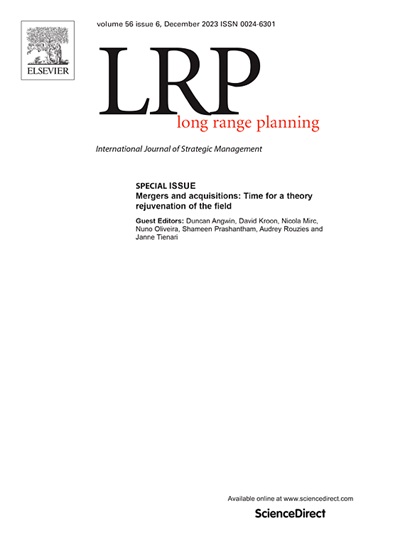Political entrepreneurs and the perils of the top office
IF 6.3
2区 管理学
Q1 BUSINESS
引用次数: 0
Abstract
This case study examines whether politically connected entrepreneurs benefit from their political connections. We study the regulated Thai telecoms industry from its inception in the early 1980s. We examine the telecoms firms owned by an entrepreneur turned politician, who rose to the position of prime minister in 2001 and was deposed in 2006. We develop the concepts of the political entrepreneur and his/her political lifecycle. We show that the value of political entrepreneur's political activities and connections varies through this lifecycle. Political entrepreneurs are likely to benefit more from informal ties with politicians and less visible political involvement early in their lifecycle, while rising to higher-level political offices is less likely to benefit them. This is due to a range of internal and external limitations on the values political entrepreneurs derive from their political activities including the negative impact of greater visibility and scrutiny from media and political opposition. Also, the business model of political entrepreneurship is likely to be copied by business rivals, causing political rents to be shared or competed away. We also find that crises increase the value of political connections.
政治企业家和最高职位的危险
本案例研究探讨了与政治有关联的企业家是否能从其政治关系中获益。我们研究了自 20 世纪 80 年代初开始受到监管的泰国电信业。我们研究了由企业家转变为政治家的电信公司,他于 2001 年升任总理,2006 年被罢免。我们提出了政治企业家及其政治生命周期的概念。我们的研究表明,政治企业家的政治活动和政治关系的价值在整个生命周期中是不同的。政治企业家在其生命周期的早期可能会从与政治家的非正式关系和不太明显的政治参与中获益更多,而晋升到更高级别的政治职位则不太可能使他们受益。这是由于政治企业家从政治活动中获得的价值受到一系列内部和外部限制,包括更高的能见度以及媒体和政治反对派的监督所带来的负面影响。此外,政治企业家的商业模式很可能被商业对手效仿,导致政治租金被分享或竞争掉。我们还发现,危机会增加政治关系的价值。
本文章由计算机程序翻译,如有差异,请以英文原文为准。
求助全文
约1分钟内获得全文
求助全文
来源期刊

Long Range Planning
Multiple-
CiteScore
13.00
自引率
7.10%
发文量
75
期刊介绍:
Long Range Planning (LRP) is an internationally renowned journal specializing in the field of strategic management. Since its establishment in 1968, the journal has consistently published original research, garnering a strong reputation among academics. LRP actively encourages the submission of articles that involve empirical research and theoretical perspectives, including studies that provide critical assessments and analysis of the current state of knowledge in crucial strategic areas. The primary user base of LRP primarily comprises individuals from academic backgrounds, with the journal playing a dual role within this community. Firstly, it serves as a platform for the dissemination of research findings among academic researchers. Secondly, it serves as a channel for the transmission of ideas that can be effectively utilized in educational settings. The articles published in LRP cater to a diverse audience, including practicing managers and students in professional programs. While some articles may focus on practical applications, others may primarily target academic researchers. LRP adopts an inclusive approach to empirical research, accepting studies that draw on various methodologies such as primary survey data, archival data, case studies, and recognized approaches to data collection.
 求助内容:
求助内容: 应助结果提醒方式:
应助结果提醒方式:


